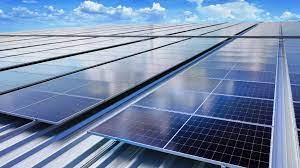- After two years of strong growth, India’s solar capacity additions fell by 44% in 2023, the lowest level since 2016.
- What caused this decline, and will this pattern continue? Let’s go exploring.
Solar Capacity Addition in 2023
- Capacity Decline: In 2023, India added 7.5 gigawatts (GW) of solar power capacity, a considerable reduction from the previous year’s record of 13.4 GW. This was the lowest level since 2016, with the exception of the pandemic-affected 2020.
- major-scale Projects Hit Hard: Capacity additions in major solar power projects fell by more than 50%, to 5.8 GW from 11.7 GW in 2022. However, rooftop solar power capacity increased by 1.7 GW, in line with 2022 levels.
- Cumulative Capacity: India’s solar power capacity will reach 72 GW by the end of 2023, with large-scale projects accounting for more than 60 GW.
Reasons for the decline.
- Regulatory Obstacles: Solar power providers faced regulatory challenges, including tougher grid connectivity standards and a Supreme Court ruling in 2021 requiring the relocation of overhead power wires to safeguard Great Indian Bustard habitats.
- Compliance Challenges: Complying with updated grid code regulations became more demanding, causing project delays. Land acquisition issues remained, substantially postponing project timelines.
Outlook for 2024
- The decrease in solar capacity addition in 2023 appears to be a temporary setback. The pipeline for 2024 is solid, with 105.3 GW of capacity planned, plus a further 70.6 GW awaiting auction.
- Delayed Projects: Large-scale projects that were delayed and extended from December 2022 to June 2023 will make a substantial contribution to capacity additions in 2024.
The Impact of ‘Make in India
- Import Reduction: Initially, India’s solar capacity was based on imported Chinese cells. However, the introduction of customs tariffs on imported solar modules and cells caused a dramatic decrease in imports.
- Promoting Local Manufacturing: The Approved List of Models and producers (ALMM) allowed local producers to compete in government procurements. However, the ALMM mandate has been deferred until April 2024 in order to keep solar installations moving forward.
Aligning with India’s Energy Targets
- Renewable Energy Capacity: In 2023, India’s renewable energy capacity hit 180 GW, with solar accounting for 40%. Despite missing its early targets due to the pandemic, India completed 60 GW of large-scale solar projects a year later.
- Future Goals: India plans to achieve a renewable energy target of roughly 600 GW by 2032, with solar accounting for 365 GW. To accomplish this aim, 30 GW of new solar capacity must be added annually for the next eight years.
Various policy initiatives.
- Solar Park Scheme (2014): Launched in 2014, the Solar Park Scheme proposes to create a succession of solar parks, each with a capacity of approximately 500 MW, spanning multiple states.
- The Rooftop Solar Scheme (2016) aims to harness solar energy by putting solar panels on residential rooftops.
- National Solar Mission (2010): The National Solar Mission is a critical initiative by the Indian government and state governments to promote sustainable development and address energy security concerns.
- The SRISTI Scheme (2018) is designed to support the installation of rooftop solar power plants in India, hence increasing sustainability.
- International Solar Alliance, 2015: The International Solar Alliance, founded in 2015, acts as a collaborative platform for promoting the adoption of solar energy technology through member-led projects.
- Kisan Urja Suraksha Evam Utthaan Mahabhiyan (2019) The PM-KUSUM project, launched by the Ministry of New and Renewable Energy (MNRE) in 2019, promises to make it easier to deploy off-grid solar pumps in rural areas while also reducing reliance on the grid in connected regions.
Conclusion
- Despite the short pause, India remains dedicated to increasing its solar capacity in order to reach its ambitious renewable energy ambitions and contribute to global environmental initiatives.
Source: https://frontline.thehindu.com/news/despite-slowdown-in-india-clean-energy-boom-experts-confident-of-resurgence-renewable-energy-fossil-fuels-ieefa-climate-change/article67820911.ece

